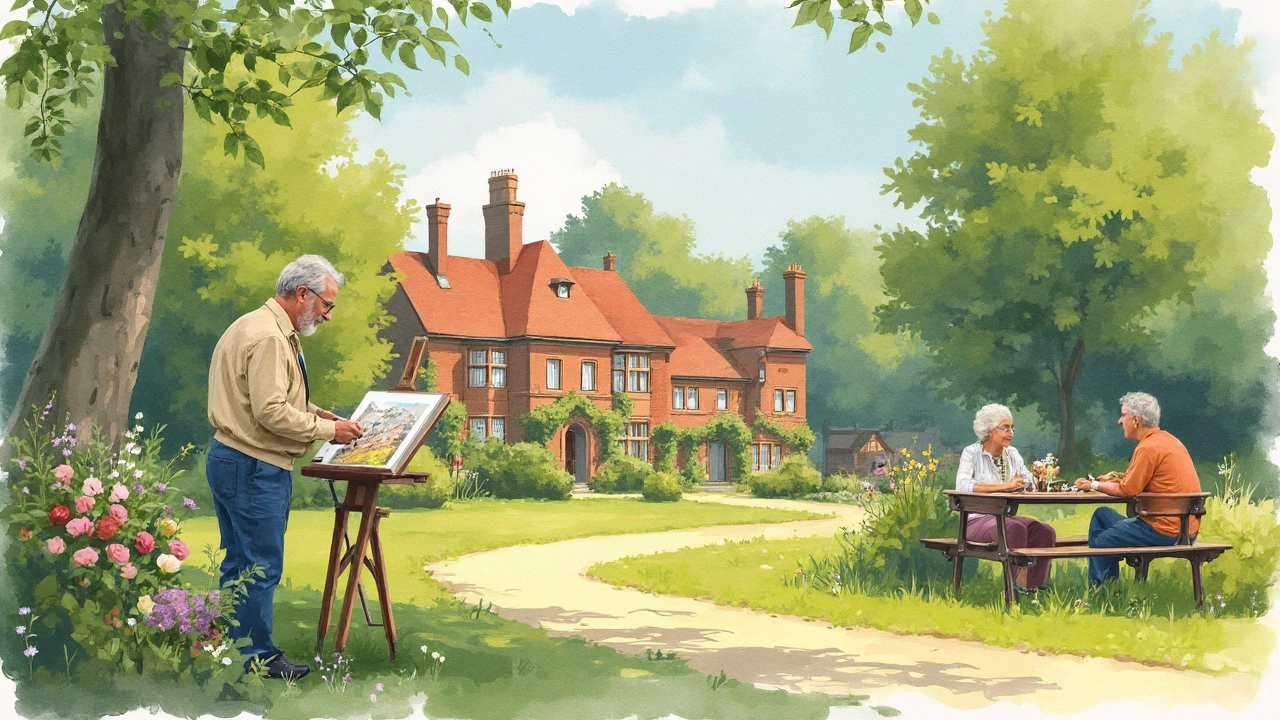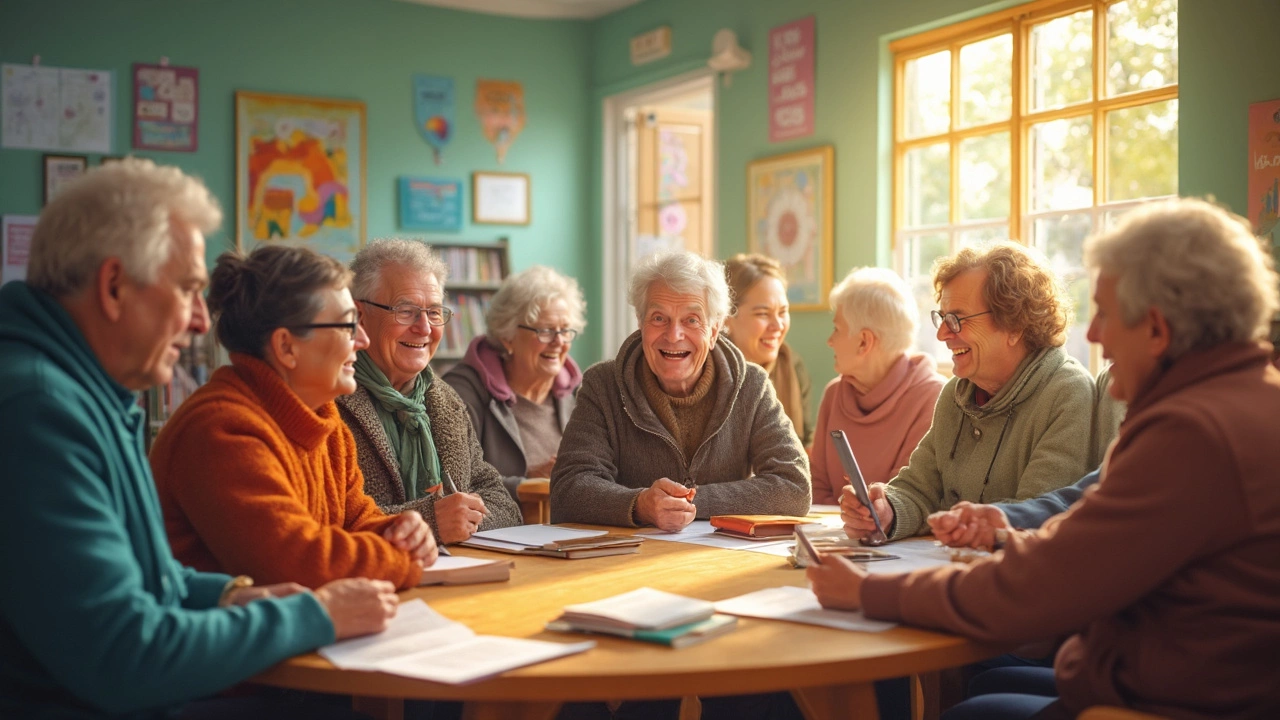Who said you need to stop learning just because you’ve hit 60? In fact, scientists found that older adults who keep learning not only stay sharper but often feel happier and more connected. Things like picking up a language, diving into photography, or finally learning to code can actually help your brain make new connections, no matter your age.
You don’t need to go back to school full-time or stress over tests. Try online classes from sites like Coursera or YouTube, join a book club at your local library, or find a hobby group—plenty of people start with zero experience. Just choose something that sparks your curiosity and go for it.
If you’re worried about technology, don’t be. Most platforms have beginner guides, and many public libraries offer free tech help for seniors. Start slow and give yourself permission to make mistakes. That’s part of the process. The best part? There’s no rulebook. You can learn in pajamas, skip homework, and ask as many questions as you want.
- Why Learning After 60 Matters
- Getting Over the Fear of Starting Again
- Smart Learning Methods That Actually Work
- Tools and Resources for Seniors
- Making It Fun and Social
Why Learning After 60 Matters
Keeping your mind active after 60 isn’t just about picking up a new skill for fun—it literally changes your brain. There’s a famous study from the University of Texas that found seniors who tried out new activities, like digital photography or quilting, actually boosted their memory compared to folks who did things they already knew. Learning new stuff makes your brain create fresh pathways, which helps you stay sharp.
Your overall health gets a lift too. Research from Harvard shows that seniors who engage in learning are less likely to feel isolated or depressed. It makes sense: people who keep learning often stay more social and feel more purpose in their lives.
It’s not just about memory and moods. People over 60 who keep studying are less likely to show signs of dementia, according to the Alzheimer’s Society. So, building your mental “muscle” can protect you long-term, and it doesn’t matter if you’re learning Spanish, brushing up on tech, or trying watercolors.
All the evidence points to one thing: adult education is one of the best hacks for a longer, happier, more independent life. And you get to choose what you learn. So honestly, there’s no downside to picking up where you left off—or starting brand new.
Getting Over the Fear of Starting Again
So, you want to keep learning after 60, but some part of you feels nervous? That’s totally normal. Lots of folks worry about looking silly, feeling behind, or not being able to keep up. But here’s a fact: The human brain can form new connections at any age. Researchers at Harvard actually found that older brains can adapt and even grow in response to new learning. You’re not too old to get started—in fact, your life experience gives you an edge.
Check out this quick snapshot of what holds most people back and how many seniors manage to beat the odds:
| Common Fear | Reality |
|---|---|
| "I'm too old to learn." | Studies show people over 60 can still learn new skills. |
| "I'll embarrass myself." | Most learners in senior groups feel supported, not judged. |
| "Technology is too tricky." | 85% of seniors who take tech classes say it gets easier fast. |
If you want to get over those fears, here are some steps you can take:
- Start with something familiar or interesting. Don’t dive into rocket science if recipes or family history spark more excitement.
- Find a learning buddy. Everything’s less scary with someone in your corner—ask a friend to join, even if you’re just learning together online.
- Set small, simple goals. Instead of thinking, “I have to learn Spanish,” try “I’ll learn ten words this week.” Tiny wins motivate you to keep going.
- Celebrate progress, not perfection. Messing up is part of the game, for anybody—young or old. Every new thing you try makes your brain stronger.
And here’s something interesting: according to the Pew Research Center, participation in adult education courses among adults age 60+ doubled over the past decade. You’re far from alone in wanting to pick up new skills or knowledge.
Nervousness usually fades after the first couple of sessions, so try not to let that first hurdle trip you up. Most people look back and wish they’d started sooner.

Smart Learning Methods That Actually Work
Forget the old-school image of drills and endless note-taking. People over 60 learn best when the approach fits real life and makes sense for how our brains work now. The big trick? Mix it up, keep it active, and link new info to stuff you already know.
Scientists from Harvard found that older adults remember more when they use practical examples, hands-on practice, and talk things through with others. That means you learn faster by doing and sharing, not just by reading or watching videos. It’s called “active learning”—think cooking along with a recipe video instead of just watching it.
"The evidence is clear: adults continue to learn and form new brain connections well into older age, especially when challenged in ways that are meaningful to them." — Dr. Lydia Cho, neuroscientist, Johns Hopkins University
A study in 2022 showed that seniors who did small group workshops learned new digital skills 35% quicker compared to those who studied alone. Chatting with others, teaching what you’ve picked up, or just explaining your thoughts out loud really helps your brain hold onto info.
- Chunk learning into bite-size pieces. Focus on one topic at a time—don’t try to cram.
- Repeat over time. A few short sessions spread through the week work better than one marathon.
- Use multiple senses. Mix reading, listening, and hands-on activities.
- Write it down in your own words. Ditch word-for-word copying—summarizing sticks better.
- Talk about it, even if it’s to yourself. Out loud “teaching” helps.
It helps to see what sticks. If you like stats, check this out:
| Learning Style | Info Remembered After 1 Week |
|---|---|
| Reading | 10% |
| Listening (podcast, audio book) | 20% |
| Watching videos | 30% |
| Active/Hands-on | 70% |
| Teaching Others | 90% |
So yeah, being active, discussing with others, and jumping in is the most powerful path—especially in adult education. And there’s no perfect method for everyone. Test a few styles, notice what feels easy, and lean into it. The goal isn’t to be the best learner ever—it’s to keep your mind working and have fun doing it.
Tools and Resources for Seniors
If you’re over 60 and ready to start learning again, the right tools make things way easier. These days, you don’t have to juggle thick textbooks—there’s tons of free and paid stuff online and in your local community. It really comes down to finding what fits your pace and interests.
First, a lot of seniors find online learning handy because you can do it anywhere, even on your tablet or phone. Websites like Coursera, Udemy, and Duolingo offer courses in everything from history to gardening. Many of these let you learn at your own speed, and you can pause or repeat lessons as much as you like.
Libraries are goldmines, not just for books but also for classes and technology help. The American Library Association reports that 76% of libraries offer digital skills training, including how to use email, browse the web, or join a virtual class. Most have friendly staff who will walk you through the basics too.
If social learning is more your thing, check out local community centers or senior centers. These often have workshops, book clubs, and guest speakers. If you’re more adventurous, the Osher Lifelong Learning Institute offers non-credit classes for older adults at many universities across the U.S. Just bring your curiosity—no grades or pressure.
Technology shouldn’t feel overwhelming. Many seniors use iPads or Chromebooks because they’re simple and reliable. If you’re just getting started, look for devices with bigger buttons, voice control, or built-in tutorials.
| Resource | What It Offers | Cost |
|---|---|---|
| Coursera | Wide range of online courses | Free or paid |
| Duolingo | Language learning | Free |
| Your Local Library | Books, tech help, classes | Free |
| Osher Lifelong Learning | University-level classes for seniors | Usually $50-$150/term |
| Senior Planet | Tech workshops for seniors | Free or donation |
Don’t be shy about asking for discounts—many sites and classes offer special rates for older adults. The key for adult education at this stage? Stay open-minded, use what’s handy, and reach out if you need help. Every tool is just a shortcut to what counts: learning something new that lights you up.

Making It Fun and Social
Learning after 60 isn't just about books and screens—it's about connecting with others and enjoying yourself in the process. Studies from Stanford show that seniors who learn with others often stick with it longer and remember more. Turning education into a social activity can seriously boost your motivation and make the hard stuff way easier.
If you love conversation, look for local community classes or workshops. Community centers, libraries, and even some coffee shops run group classes on everything from cooking basics to smartphone skills. You'll pick up something new and probably find a friend or two along the way.
- Book clubs and discussion groups are perfect for staying mentally sharp. Local libraries usually host these and anyone can join, no matter your reading speed.
- Got a smartphone? Apps like Meetup can point you toward group hikes, art sessions, and language exchanges nearby. Most groups welcome beginners and are happy to teach new faces.
- Online study groups offer connection even if you’re at home. Sites like Coursera and FutureLearn have discussion boards and live chats, so you can bounce ideas off others.
If you feel more comfortable learning from home, try video calls with friends or family. Pick a topic and meet once a week to chat. You could buddy up with someone to watch history documentaries or even tackle those tricky crosswords together.
The key is to stay social while you learn. You’ll enjoy it more and, according to Harvard research, laughter and group activities actually improve recall. So laugh, ask questions, share stories. Adult education can be as much about having fun as it is about learning facts.


Write a comment